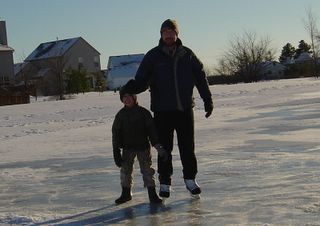In order to make my purchase less of a waste, another not-very ambitious goal of mine is to use them outside on a pond (where skates are not rented) at least once a year. Here I am on the local neighbourhood pond. Conditions weren't all that great, as there was some snow and slush. We brought along a shovel, but I didn't venture too far out as I didn't trust it out there. (I think I heard a crack once.)
All-in-all, the three of us (G, Delhi, and me) had a good time in the snow and ice. It was about 10F (-12C), but nobody complained of being cold -- a first, I think.
 (Photo by Delhi)
(Photo by Delhi)
While I'm on the subject, I've noticed a difference in how kids are taught to treat frozen ponds in the wintertime compared to when I was a kid. Perhaps this is because I grew up in slightly more northerly climes than where I live now. Or perhaps it is due to global warming, or more likely, liability insurance. But, when I was in Boy Scouts, and maybe school, we were taught how thick the ice had to be to be safe for one person, a small group, and a large group. Now, as best as I can tell, it seems that kids are told, "Always stay off frozen ponds, no matter what." That's a shame.
By the way, the pond has signs that say, "NO BOATING; NO SWIMMING; NO WADING." Since the sign doesn't say anything about skating or walking on the ice, I figure we're OK.
7 comments:
And if you're not OK, they've left themselves open for litigation. ;)
It wasn't that long ago that I came to realise that in the Northern hemisphere, entire ponds don't freeze in winter and that fish could survive a freeze by staying in cold water below it. So, knowing this, with only a thin ice crust on top, I'm surprised that anyone would risk it by skating, especially since our winters seem a little milder thesedays. Dave, are you being a bad (risktaking) parent? -DFV
Nah, people have been playing on ice ever since ice was invented. Quoting my Scout Handbook (July 1976 Edition), "1 inch -- keep off; 2 inches -- one may; 3 inches -- small group; 4 inches -- OK".
Of note is that on the "OK" section includes a drawing of a group of people and a snowmobile.
You'd be surprised how strong 10 cm of ice actually is -- I probably wouldn't go on anything thinner, no matter what the Handbook says. Of course, you need to make sure that the entire surface that you're on is that thick, and not just where you checked it.
I'm a good parent. "Safety, Schmafety", that's my motto.
But how do you know how thick it is? -DFV
You look at it. (Ice can be slightly transparent.) I've heard that some people bring a drill and drill though it as well. Then you go on the edge gingerly. If that goes well, next you jump up and down as hard as you can...
Can you imagine that on a JSA, DFV? ;)
DFV, I'm with poutineq. The first place I ever skated in my entire life was a frozen pond. My parents took my brother and me out and taught us how to check for ice depth and how to balance on the skates.
Millions of Scandanavians do the same, and millions before us also did the same -- skated on frozen ponds. Look at a Currier & Ives lithograph sometime.
Poutineq is ensuring that the next generation will actually know something practical, and can have fun later in life (as adults) whether there is a (costly) indoor ice rink in their area or not. Far from being a risk-taking parent, he is instilling a love of nature and the joy of real skating (before climatized ice rinks) in his kids!
As for taking a risk... it is hardly risky to go out on a pond, look at it carefully with the kids, have a discussion, and use one's good judgement. The kids learn an important lesson through it -- that risks can be minimized through using one's noggin first. "Look before you leap," you know?
Sorry, but I see nothing but positives out of this.
Post a Comment